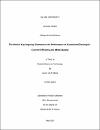The Role of Key Impurity Elements on the Performance of Aluminium Electrolysis - Current Efficiency and Metal Quality
Abstract
Impurities such as phosphorus and silicon mainly enter the aluminium electrolysis process with alumina. These impurities dissolve in the electrolyte and affect the performance of the electrolysis, the emissions from the cells and the quality of the metal produced. In the present work, the behavior of phosphorus and silicon species in the industrial Hall-Héroult cells was investigated. The study was based on the deleterious effect of phosphorus and silicon on the aluminium production process. It is established in the literature that for every 100 ppm of phosphorus in the bath the current efficiency is decreased by 1%. The chemical and electrochemical behavior of phosphorus and silicon compounds in the Hall-Héroult process was studied. Measurements were as well carried out in QATALUM industrial cells by analysis of bath and metal after addition of phosphorus and silicon compounds to the bath. Additions of AlPO4, Na3PO4 and SiO2 to the industrial prebaked cells were performed and the variation of the concentration in both the bath and metal was followed over time. Phosphorus showed to have a much longer retention time in the bath than silicon. Variations during start-up of cells and anode effects seemed to influence the phosphorus and silicon level in the cells. From industrial data trends, it can be observed that the amount of phosphorus in the cells decreases with increasing the operating temperature. It was found that merely small amounts of phosphorus are reduced at the cathode. Unlike phosphorus, large amounts of silicon were primarily reduced at the cathode and ended up in the metal. Mass balance for phosphorus for prebake cells was presented. It was found that a massive amount of the phosphorus entering the cells was transported with the off-gases to the dry scrubbers. Since the secondary alumina is used as feeding for the prebake cells, the phosphorus is recycled back and will end up in the produced metal.
DOI/handle
http://hdl.handle.net/10576/3908Collections
- Materials Science & Technology [68 items ]


